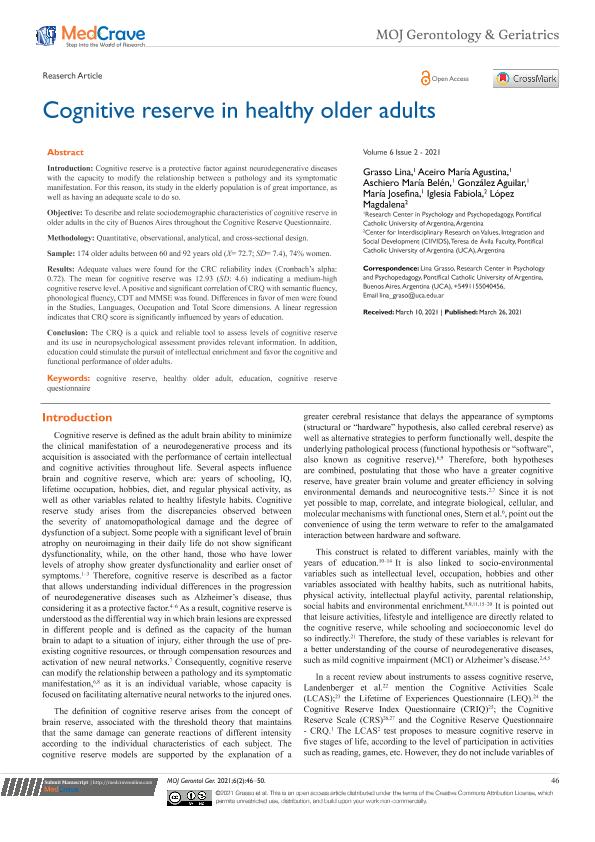Artículo
Cognitive reserve in healthy older adults
Grasso, Lina ; Aceiro, María Agustina
; Aceiro, María Agustina ; Aschiero, María Belén
; Aschiero, María Belén ; Gonzalez Aguilar, Maria Josefina
; Gonzalez Aguilar, Maria Josefina ; Iglesia, Maria Fabiola
; Iglesia, Maria Fabiola ; López, Magdalena
; López, Magdalena
 ; Aceiro, María Agustina
; Aceiro, María Agustina ; Aschiero, María Belén
; Aschiero, María Belén ; Gonzalez Aguilar, Maria Josefina
; Gonzalez Aguilar, Maria Josefina ; Iglesia, Maria Fabiola
; Iglesia, Maria Fabiola ; López, Magdalena
; López, Magdalena
Fecha de publicación:
03/2021
Editorial:
MedCrave
Revista:
MOJ Gerontology & Geriatrics
e-ISSN:
2574-8130
Idioma:
Inglés
Tipo de recurso:
Artículo publicado
Clasificación temática:
Resumen
Introduction: Cognitive reserve is a protective factor against neurodegenerative diseases with the capacity to modify the relationship between a pathology and its symptomatic manifestation. For this reason, its study in the elderly population is of great importance, as well as having an adequate scale to do so. Volume 6 Issue 2 - 2021 Grasso Lina,1 Aceiro María Agustina,1 Aschiero María Belén,1 González Aguilar,1 María Josefina,1 Iglesia Fabiola,2 López Magdalena2 Objective: To describe and relate sociodemographic characteristics of cognitive reserve in older adults in the city of Buenos Aires throughout the Cognitive Reserve Questionnaire. Methodology: Quantitative, observational, analytical, and cross-sectional design. Sample: 174 older adults between 60 and 92 years old (X= 72.7; SD= 7.4), 74% women. Results: Adequate values were found for the CRC reliability index (Cronbach’s alpha: 0.72). The mean for cognitive reserve was 12.93 (SD: 4.6) indicating a medium-high cognitive reserve level. A positive and significant correlation of CRQ with semantic fluency, phonological fluency, CDT and MMSE was found. Differences in favor of men were found in the Studies, Languages, Occupation and Total Score dimensions. A linear regression indicates that CRQ score is significantly influenced by years of education. Conclusion: The CRQ is a quick and reliable tool to assess levels of cognitive reserve and its use in neuropsychological assessment provides relevant information. In addition, education could stimulate the pursuit of intellectual enrichment and favor the cognitive and functional performance of older adults.
Archivos asociados
Licencia
Identificadores
Colecciones
Articulos(SEDE CENTRAL)
Articulos de SEDE CENTRAL
Articulos de SEDE CENTRAL
Citación
Grasso, Lina; Aceiro, María Agustina; Aschiero, María Belén; Gonzalez Aguilar, Maria Josefina; Iglesia, Maria Fabiola; et al.; Cognitive reserve in healthy older adults; MedCrave; MOJ Gerontology & Geriatrics; 6; 2; 3-2021; 46-50
Compartir
Altmétricas



